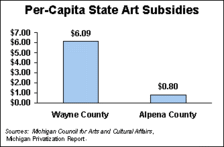
Eighty years ago in Petoskey, Michigan, pedestrians walking past Mrs. Evva Potter's boarding house at 602 State Street would have heard the furious clack-clack of an old typewriter sounding from the second story window. Young Ernest Hemingway, back from World War I, was taking his first steps toward a writing career that would ultimately lead him to widespread critical acclaim, worldwide notoriety, and the Nobel Prize in Literature.
The one-hundredth anniversary of the famous author and one-time Michigan resident's birth provides a good opportunity to remember a controversial life of rugged individualism and self-reliance—and to take an important lesson about keeping art separate from politics.
Ernest Miller Hemingway was born July 21, 1899, in Oak Park, Illinois, a genteel suburban community whose residents were unanimous in their distrust of nearby Chicago's big-city politics. His paternal grandfather, Anson, was a Civil War veteran who donned a Union uniform and sword every Memorial Day, and his mother's family was descended from John Hancock, a signer of the Declaration of Independence.
Hemingway spent his first 19 summers at the family cottage on Walloon Lake near Petoskey, where his father, an accomplished outdoorsman, taught him how to hunt and fish. The forests and streams of Emmet and Charlevoix Counties provided Hemingway with the background for many of his early, and autobiographical, "Nick Adams" short stories, which featured characters modeled after his Michigan acquaintances.
Michigan also gave Hemingway his first taste of freedom from the stifling and insulated world of suburban life. Hunting, camping, and fishing with his friends in the northern woods offered him a feeling of independence from the parochial concerns of his parents, four sisters, and younger brother.
Freedom and independence would be recurring themes throughout Hemingway's adult life. He believed, he said, "in the absolute minimum of government" and that people should work hard and take care of themselves rather than live by politics. In 1935, when many American writers were championing the Soviet Union and its state-run economy, Hemingway wrote to a Russian critic that he could not become a communist "because I believe in only one thing: liberty."
By 1937, however, Hemingway was serving as an "anti-war correspondent" in the Spanish Civil War and propagandist for the Soviet-backed Spanish government. Many communists viewed this as proof of his conversion to Marxism; however, it seemed to others that he was fighting more against the fascist rebels and their Nazi allies than he was for the communists of Spain, his "adopted country."
Hemingway's independence asserted itself in his art. In 1940, he released For Whom the Bell Tolls, a novel based on his Spanish war experiences. The book angered many of his left-wing critics because it depicted the Spanish communists to be as brutal and corrupt as their enemies. "A writer's job," he explained, is "to tell the truth."
Hemingway believed that politics corrupts the creation of art, which is necessarily a function of the individual. "The hardest thing to do," he said, "is to write straight honest prose on human beings," and writers "have to do it alone." According to Hemingway, a writer who uses politics to advance his career might "get to be an ambassador or have a million copies of his book printed by the government," but he is betraying his craft.
During his lifetime, Hemingway gave generously of his time and money to help promising young writers, stressing to them the importance of developing their own unique styles. Undoubtedly, it never occurred to him to call for government art subsidies, which subject the individual's creative and artistic vision to committees of bureaucrats doling out millions of tax dollars, often according to some political agenda.
Hemingway accepted the Nobel Prize in 1954 for his enormous individual contributions to literature, which included such great works as A Farewell to Arms, The Sun Also Rises, and The Old Man and the Sea. Were he alive today, his contribution might include supporting other writers through groups such as the newly formed Creative Capital Foundation (CCF), a privately funded alternative to such government programs as the National Endowment for the Arts and the Michigan Council for Arts and Cultural Affairs.
Without involving government, CCF intends to offer grants to individual artists who, like Ernest Hemingway before them, "challenge convention." The first convention that should be challenged is the one that says art and culture must depend on the state for their existence.
#####
(David Bardallis is policy writer and editor with the Mackinac Center for Public Policy, a Midland-based research and educational institute, and a member of the Michigan Hemingway Society. More information on Michigan history and economics is available at www.mackinac.org. Permission to reprint in whole or in part is hereby granted, provided the author and his affiliations are cited.)

The Mackinac Center for Public Policy is a nonprofit research and educational institute that advances the principles of free markets and limited government. Through our research and education programs, we challenge government overreach and advocate for a free-market approach to public policy that frees people to realize their potential and dreams.
Please consider contributing to our work to advance a freer and more prosperous state.